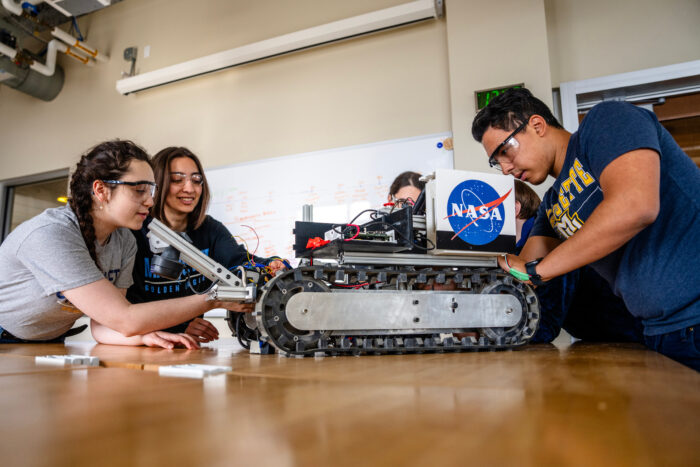Is engineering looking like a possible path for a high school student in your life? In some cases, they may already be saying they want to pursue engineering, and in other cases, they may simply be exhibiting curiosity, a knack for problem solving and an affinity for technology.
As family members, mentors and educators, it is always wise to give students some space to explore their futures independently. But it is also important to help protect them from selling themselves short, misunderstanding their options or even making choices that could inadvertently close doors for them. If you have a possible “future engineer” in your life, below are four tips on how to mentor and empower them on their path ahead. If you are interested in more advice on these topics or specific resources, please reach out.
Help them see themselves in the field
If a student is unfamiliar with engineering or if they find it intimidating, a good solution is to introduce them to real engineers.
Meeting engineers in their community or even reading about examples of public figures in engineering allows students to see the impact of engineering and the lifestyle of an engineer. Students will also discover that engineering professionals are all unique individuals – they have their own hobbies, families, personalities, weaknesses and strengths.
It is also important that students can see engineers with similar backgrounds to them. Learning about or meeting engineers of the same race, gender, religion, hometown or similar life experiences as them is an important way for them to recognize their potential to succeed as an engineer.
Students may also discover that engineers thrive in a wide variety of professions. In fact, many engineering graduates go on to lead work in business management, law, medicine, education, entrepreneurship and more. If your student chooses to study engineering, they will learn to be an excellent problem solver – it will be up to them to decide how to use that gift in a variety of career possibilities.
Networking within your community a great place to start for this, but exploring pre-college programs and shadow experiences with local universities, companies and STEM organizations can also be a good way to jump in. Let us know how we can help.
Before focusing on majors, discuss problems to solve and people to serve
Simply put, engineering is about solving problems and serving others. Before students jump on a possible engineering major, you should ask them to consider what problems – local or global, big or small, old or new – spark their passions.
Oftentimes, students in their college search will fixate on a school because it has the exact major they want, even if they don’t fully understand what that type of engineer really does. If they instead focus on the problems they want to solve, they may be able to explore multiple majors and a wider variety of schools. Then they can truly evaluate what schools and programs will help them become the problem solver they envision for their future.
Once in college, this focus will also help them understand the why behind their hard work. When engineering courses get difficult, students tend to find success and stamina when they see the “big picture” of what problems they can solve in the future.
And during future interviews and career fairs, students who are focused on the problems they want to solve can also speak more confidently about their skill sets and potential. You could be surrounded by other electrical engineers – what else can you say about yourself as an engineer?
Face high school math (with positivity)
Engineering is much more than math, but math is foundational to the work in college. If your student wants to become an engineer, it is wise to keep them on track with math in high school. It can be tempting to divert away from challenging math topics, but doing so could hinder a student’s success or even acceptance to certain college engineering programs.
A first step would be to fully understand your high school’s math curriculum options, and then compare that to expectations of certain college programs your student may be interested in. You may still end up having good reasons for any math path you choose, but it is best to be as informed as possible.
You can also support students by avoiding language related to not being a “math person.” This language can dissuade young people at a very early age from realizing their full potential. Do your part by treating math as a positive. Anyone can do math.
Admittedly, the balance of what classes to take and how to maintain a competitive GPA can be a tricky part of preparing for college applications. Every student is different, but the main advice here is: if you’re interested in engineering, don’t undervalue your math learning.
Explain that it is NOT “one or the other” for their passions
Does the student in your life also love something “outside” of engineering? Art? Sports? Music? Fashion? History? Literature?
That is a wonderful gift! As a family member, mentor or educator, please explain to them that holding onto their passions is a good thing, and that those “other passions” can be complementary to engineering, or in some cases, fully within engineering.
Engineering course work is demanding, but students do not say farewell to what makes them special and what lights up their spirits. At Marquette, we have students with extra majors or minors, or who fill their plate as athletes, musicians, artists, student organization leaders, entrepreneurs and more. This multi-faceted experience is what makes college so transformative. Plus, having varied interests and experiences makes us stronger innovators, collaborators and engineers.
In some cases, your student may even discover or invent a unique connection between engineering and their other passions. Engineering is a growing field with connections to all sorts of industries, communities and applications.
Do the world a favor and help your student shine. Don’t let them get stuck inside a box.
There is much more to share, but these four tips seemed to be what families, educators and mentors need to hear the most right now. As an adult, please recognize and appreciate your role in mentoring and empowering students as they consider their paths ahead. Even small comments, minor decisions or brief experiences can spark amazing things for the future leaders and changemakers in our communities.
Interested in more engineering content like this for families, mentors and educators?



